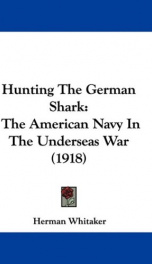hunting the german shark the american navy in the underseas war

HUNTING THE GERMAN SHARK CHAPTER 1 THE AMERICAN NAVAL FORCES IN EUROPEBN WATERS IT is now more than a year since the first units of the American Fleet sailed away from our shores and mere promptIy lost to view in those mists of secrecy with which the British Admiralty then camouflaged its sea operations. Now and then a flash of information blazed out of the war fogs-as when the British First Sea Lord announced in Parliament early in 1918 that be- tween forty and fifty per cent. of U-boats were being sunk. But of the manner in which they came to their ends we were not informed. Generally speaking, that policy of silence was good at the time. Whether they were sunk by shell-fire, mines, torpedo, collision with each other or with sunken rocks, or through internal defects of their own, he could not tell. He knew only that after two and a half voyages, on the average, they did not return and we have good reason to know that the mystery that surrounded their fate seriously impaired the morale of his crews. For England-a small country geographically, and the seat of the underseas war-this policy of silence did not entail much hardship. Considerable news seeps down to the man in the street from clubs and other sources. Though nothing was printed of the submarine war, everybody kncw that it was going well news of individual feats of galIantry soon spread through the nation. In America, however, the conditions are entirely different. San Francisco is farther from New York than the latter city is from London. We are too far from the war, our borders are too wide, for the dissemination of information by word of month...... --This text refers to an alternate Paperback edition.
Info about the book
Author:
Series:
Unknown
ASIN:
054672230X
Rating:
4/5 (1)Your rating:
0/5
Languge:
English
Users who have this book
Users who want this book
What readers are saying
What do you think? Write your own comment on this book!
write a commentif you like hunting the german shark the american navy in the underseas war try:
Other books by this author
Do you want to exchange books? It’s EASY!
Get registered and find other users who want to give their favourite books to good hands!







